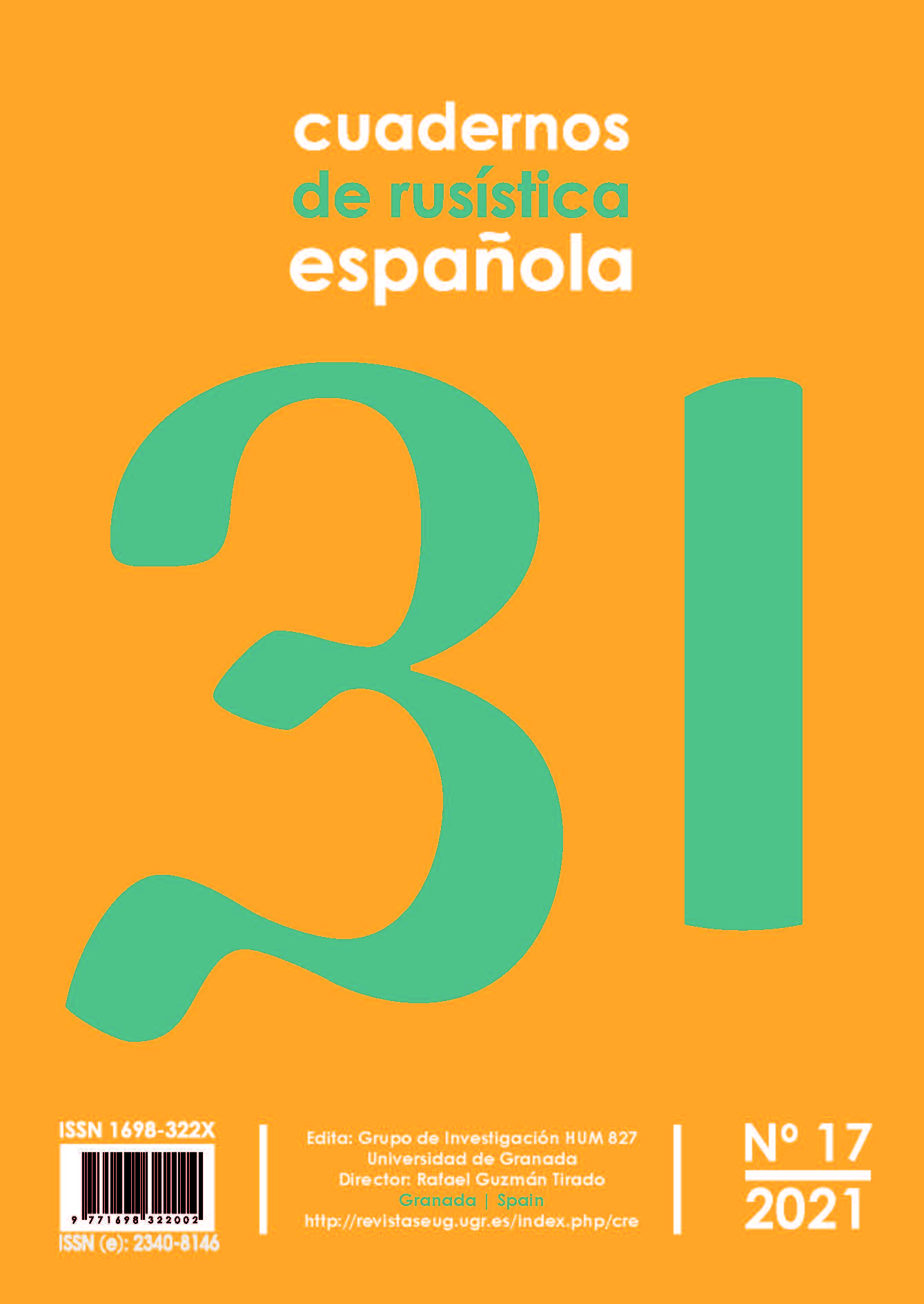Problems of Atypical Interiorization of Multi-Valued Omonyms of the Non-Native Language (based on the Relation of the Word “Предложение” to its Corresponding Words in English and Yoruba)
DOI:
https://doi.org/10.30827/cre.v17.21054Keywords:
linguistic interiorization, reasons for low level of language interiorization, cross-cultural communication, cognitive linguisticsAbstract
The article is devoted to research of interiorization process as a linguistic action which involves the intended external knowledge transfer in terms of the target language elements into the inner linguistic knowledge of an individual in process of non-native language learning. Linguistic interiorization suggests that a student learns a new linguistic reality by perceiving it through the prism of his or her mother language or an interlanguage via their comparison, that is, revealing similarities and differences between them. The research includes the analysis of the language data recorded in dictionaries and their use in the particular contextual conditions. Based on the analysis presented, the author identifies some causes that complicate the linguistic interiorization. Among these reasons, the author calls the unequal semantic volume of words in the studied and native languages, the functioning of homonyms complicated by multiple connotations, and the involvement of other words forming a semantic network with multiple vibration zones. It was concluded that incongruity of the linguistic structures in mother and non-native languages reduces effectiveness of the new language learning, making interiorization unstable. In this case, referring to a mediator language and a mother language helps overcome the reasons for low level of internalization.
Downloads
References
AKHUTINA, T.V. (2004): “L.S. Vygotskij: kul'turno-istoricheskij i estestvenno-nauchnyj podhody k interiorizacii” (“L.S. Vygotsky: cultural, historical and natural-scientific approaches to interiorization”), Vestnik Moskovskogo universiteta (Bulletin of Moscow University), 14, рр. 41–56.
Bertau, M.-C. (2010): “The Meaning of voice for the process of interiorization”, Tätigkeitstheorie, 1, рр. 9-20.
BRUNER, Dzh. (1977): “Psihologiya poznaniya. Za predelami neposredstvennoj informacii” (“Psychology of cognition. Outside the immediate information”). Moscow, 413 р.
DIMAGGO, G., HERMAN, H.J.M. (2006): “Changing the dialogue between self voices during psychotherapy”, Journal of psychotherapy integration, 16(3), рр. 313–345.
DIMAGGO, G., HUBERT, H.J.M., LYSAKER, P.H. (2010): “Health and adaptation in a multiple self: The role of absence of dialogue and poor metacognition in clinical populations”, Theory & Psychology, 20, рр. 379–399.
FROMM, Er. (1941): Escape from freedom. Holt, Rinehart and Winston: New York. 305 р.
DYURKGEJM E. (1914): “Sociologiya i teoriya poznaniya” (“Sociology and the theory of knowledge”), Novye idei v sociologii (New ideas in sociology), 2, рр. 27–67.
GAL'PERIN, P.YA. (1999): “Vvedenie v psihologiyu” (“Introduction to Psychology”). Moscow, 332 р.
JANET, P. (1963): L'Intelligence avant le langage. Paris, Flammarion, Bibliothèque de philosophie scientifique. 292 р.
LEONT'EV, A.N. (1972): “Problemy razvitiya psihiki” (“Problems of the development of the psyche”). Moscow, 576 р.
MARKS, K., ENGEL'S, F. (1961) “Сочинения” (“Writings”). V. 25, р. 1. Moscow, 554 p.
NEKIPELOVA, I.M. (2013): “Konvergenciya i divergenciya sub"ektivnyh yazykov i ih statisticheskoe raspredelenie v formirovanii ob"ektivnogo yazyka” (“Convergence and divergence of subjective languages and their statistical distribution in the formation of an objective language”), Filologicheskie nauki. Voprosy teorii i praktiki (Philological Sciences. Questions of Theory and Practice), 4 (23), I, рр. 123–126.
NEKIPELOVA, I.M. (2015): “Yаzyk i rech': rost i istinnost' informacii” (“Language and Speech: The Growth and Truth of Information”), Filologicheskie nauki. Voprosy teorii i praktiki (Philological Sciences. Questions of Theory and Practice), 2015, 2 (44), I, рр. 146–148.
NEKIPELOVA, I.M. (2021): “Sootnoshenie mnogoznachnyh slov izuchaemogo i rodnogo yazykov kak osobyj sluchaj yazykovoj interiorizacii” (The ratio of multi-valued words of the studied and native languages as a special case of linguistic interiorization), Ruski jezik u digitalnom okruženju u vrijeme pandemije / Urednica Irena Mikulaco. Iz-davač: Sveučilište Jurja Dobrile u Puli, Hrvatska, Pula, с. 541-529.
PISHCHAL'NIKOVA, V.A. (2010): “Sovremennye paradigmy yazykoznaniya” (“Modern paradigms of linguistics”). Moscow, 172 р.
PUSHKARYOVA, T.V. (2015): “Problema interiorizacii znanij v psihologo-pedagogicheskoj nauke” (“The problem of the interiorization of knowledge in psychological and pedagogical science”), Sovremennye problemy nauki i obrazovaniya (Modern problems of science and education), 1-1, рр. 35–45.
SHOTTER, Dzh. (1996): “Bahtin M.M., Vygotskij L.S.: interiorizaciya kak «fenomen granicy»” (“Bakhtin M.M., Vygotsky L.S.: Interiorization as a" border phenomenon "”), Voprosy psihologii (Questions of Psychology), 6, рр. 107–117.
SHVARKO, L.I. (2014): “Psiholingvisticheskie faktory, opredelyayushchie ponimanie inokul'turnogo teksta” (“Psycholinguistic factors determining the understanding of a non-cultural text”), рр. 93–97.
SOROKIN, YU.A. (1994): “Lakuny i process modelirovaniya obraza etnicheskoj kul'tury i psihologii” (“Lacunas and the process of modeling the image of ethnic culture and psychology”), Materialy X vserossijskogo simpoziuma po psiholingvistike i teorii kommunikacii (Materials of the X All-Russian Symposium on Psycholinguistics and the Theory of Communication). Moscow, рр. 144–156.
VYGOTSKIJ, L.S. (1960): “Razvitie vysshih psihicheskih funkcij” (“Development of higher mental functions”). Moscow, 500 р.
VYGOTSKIJ, L.S. (1982): “Sobranie sochinenij” (“Collected works”), 1. Moscow, 488 р.
ZALEVSKAYA, A.A. (2005): “Psiholingvisticheskie issledovaniya. Slovo. Tekst: Izbrannye trudy” (“Psycholinguistic studies. Word. Text: Selected works”). Moscow, 542 р.












